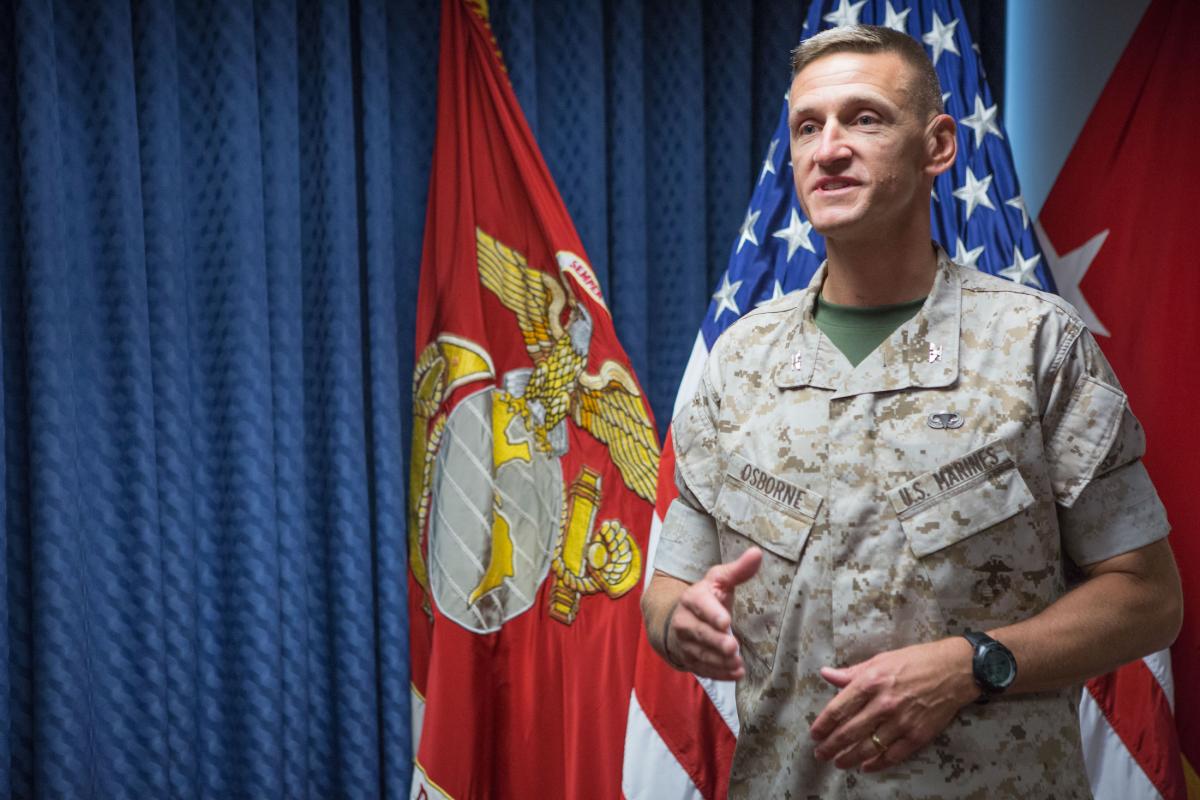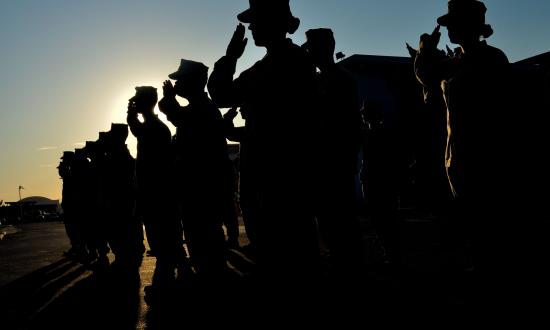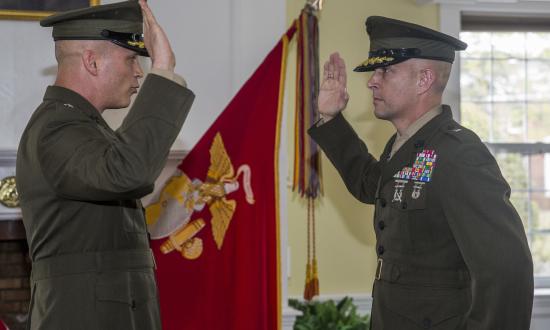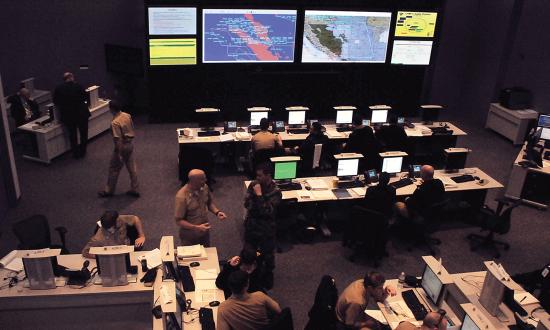Officer development in the Marine Corps largely is focused on preparing Marines for command, and promotion hinges chiefly on an officer’s potential as a commanding officer. But only a small minority of officers are in command at any given time. Even fewer are destined to command battalion-sized or larger units. On the other hand, most officers will serve on staffs for much of their careers, and good staff officers are rare and valuable. Yet the Marine Corps does a poor job identifying and using them, the term “staff officer” has an undeservedly negative connotation, and the service forces every officer onto the command track—or out of the service—even if his or her talents and interests lend themselves to staff work. To fix this, the Marine Corps should create a staff officer career track.
The Root of the Problem
While all officers have to serve on staffs, not all officers are suited for staff work. My experience in 2017 with the 24th Marine Expeditionary Unit (MEU) command element opened my eyes to this bleak reality. Toward the end of the deployment, the MEU commander asked the operations officer and me to assemble a team to draft the post-deployment brief that he planned to present at the Pentagon. It was much harder than it sounds.
Every officer on that MEU staff was capable of churning out passable emails and slapping bullets on slides for low stakes, routine staff work. But when it came time to write papers and make briefs that the Commandant himself would read—about as high stakes as staff work gets—most could not hack it. After scouring the ship, the operations officer and I finally found a few officers who could make decent slides and write and brief well. They proved invaluable.
The Marine Corps identifies its best leaders through command screening. But it has no equivalent process for staffers. Because the Corps does not know who its best staff officers are, they are underutilized, and the organization is unable to put the right Marine in the right job. There is no career path, at least formally, for strong officers who are suited for staff work and uninterested in high-level command. This one-size-fits-all approach unnecessarily squanders talent and disregards the interests of Marines. There is a better way.
What Is Staff Work?
Staff work is everything that supports a decision maker. The most familiar military staff roles are on a commander’s functional staff (administration [S-1], intelligence [S-2], etc). Less familiar positions include aides, executive assistants, speechwriters, special projects officers, and members of advisory and action groups. Staff work is not unique to the military. Members of Congress have staffs. CEOs have staffs. Xi Jinping has a staff.
Staffers research, write, brief, and plan. They analyze issues and develop options for decision. They lead meetings, provide recommendations, and staff documents. “They find and condense masses of information into manageable packets for review by and decisions from senior leaders.”
Staff officers play a critical role at every level of command in both peace and war. They range from company grade officers on a battalion staff to some of the most senior officials in the Department of Defense. There are key staff roles in both the operating forces and the supporting establishment. Staff officers support both commanders and decision makers not invested with command authority (such as the Deputy Commandants in Headquarters Marine Corps). Being a staff officer does not necessarily mean riding a desk in the A-ring of the Pentagon. It can mean working on a laptop perched on a stack of MRE boxes in a bombed-out building while being shot at. Staff work is staff work, regardless of where it is done.
A Good Staff Officer
Good staff officers have much in common with good journalists, attorneys, and management consultants: They are able to immerse themselves in an unfamiliar subject, rapidly learn about it, identify the most salient issues, and present their findings and analysis clearly and efficiently, both orally and in writing. They pay attention to the smallest details, have a good eye and aesthetic sense, and are highly organized. Not every Marine officer is endowed with these qualities.
Because these skills are generally applicable to any topic, they transcend mere occupational proficiency and subject-matter expertise. A staff officer with these traits is the utility infielder—give him or her any task and it will be done right and on time.
Good staff officers are also strong leaders in their own right, a quality often overlooked. They must lead their staff sections. They often honcho working groups and planning teams. They must be skilled at building consensus and encouraging collaboration. They must be able to influence others, despite not being in charge.1
Staffers vs. Commanders
Some good staff officers may also make good commanders—the two pools of talent do overlap. Some Marines are good at everything. The Marine Corps’ School of Advanced Warfighting (SAW), for example, selects the best applicants and develops them to be both “lead planners and future commanders” (emphasis added). Likewise, general officers have proven themselves, again and again, to be exceptional in a range of command and staff billets—that is why they are “general” officers.
But while the very best Marines may be good at everything, that is hardly true of everyone else. Some Marines have a knack for command, others for staff work. Indeed, the traits that make a Marine a good staff officer may make him or her less effective in command. Good staff officers sweat the small stuff. Good commanders often do not—they tend to wear the crown lightly. As MCDP-1 Warfighting puts it:
We should recognize that all Marines of a given grade and occupational specialty are not interchangeable and should assign people to billets based on specific ability and temperament. This includes recognizing those who are best suited to command assignments and those who are best suited to staff assignments—without penalizing one or the other by so recognizing.
And whether a Marine has a knack for command or staff work is not the only question. Just as important is what the Marine prefers. Not every officer wants to be a senior decision maker. Many would prefer to contribute in a staff role.
A Better Way
Despite the obstacles, some officers have been able to carve out careers as staffers. Over time, they develop reputations as effective staff officers and are assigned to increasingly demanding staff roles. They eventually find themselves in staff billets commensurate with their abilities and in which they can make the greatest possible contribution to the organization. But this happens only informally. While some Marines might be lucky enough to stumble into a career that makes the most of their talents as a staffer, many will not.
A staff officer career track would recognize this and offer an alternative to the command track. It would reduce the pressure Marines feel to pursue command and make it easier for good staff officers to plan their careers. And rather than being seen as the graveyard for those not good enough for command, staff officer service would be seen as a worthwhile end in its own right.
A Staff Officer Career Track
Here are some steps the Marine Corps could take to establish a staff officer career track:
Create a new secondary military occupational specialty (MOS)—Staff Officer. Marines could apply for the MOS or be nominated for it by their commanders. The top graduates of Marine Corps Command and Staff College (and other intermediate-level schools) could earn the MOS on graduation. Just as the 0505 MOS—which marks graduates of SAW and other advanced intermediate-level schools—identifies the organization’s best planners (and, perhaps, future commanders), the staff officer MOS would identify the best staffers.
Create a model for staff officer development and promotion. With a staff officer career track, no longer would Marines have to spend a prescribed amount of time in command to be competitive for promotion and desirable assignments; rather, the list of key billets could be expanded to include staff jobs that would prepare Marines on the staff officer career track for future roles of greater importance. This would give the strongest staff officers the opportunity to build a career around their strengths and interests and compete for promotion based on their potential to serve as staffers rather than commanders. It is not a radical change—this sorting happens already, albeit informally. But there is much to be gained by approaching it systematically.
Timing is critical. Officers need a broad base of experience, in both command and staff billets, before they can make an informed decision to pursue a career as a staff officer. Thus, the decision to pursue a command or staff career track should be made when captains are promoted to majors. That would ensure most officers approach the decision having spent time as a company commander and in at least one staff role.
Put good staff officers in key billets. Once the best staff officers are tagged with the staff officer MOS, key billets could be coded for it so decision makers could be guaranteed at least a few exceptional staffers supporting them. Like 0505s, the best staff officers, placed in the right roles, could have an outsized impact on the organization. The idea is not to lock staffers in the Pentagon and keep them there in a closed loop until retirement. Far from it. There are important staff billets at every level, in both the operating forces and supporting establishment.
Risks
There are real risks associated with a staff officer career track. If not done right, it could create separate officer cultures that steadily drift apart and entrench staff officers as permanent second-class citizens. And it will challenge the “every Marine a rifleman” ethos the Marine Corps holds dear.
But those risks are worth the potential rewards. As effective as the Marine Corps’ generalist approach to officer development has been, there is a clear trend—in every profession, not just the military—toward specialization. Specialization allows Marines to do more of what they do best and are most interested in. Specialization can certainly be taken too far, but creating a mid-career alternative to the standard command track is a modest, low-risk tweak to the status quo.
The Marine Corps—rightly—invests tremendous effort in selecting its best leaders through the command screening process. Yet it has no equivalent process to track and employ its most skilled staff officers. As a result, good staff officers are undervalued and underutilized. This is inefficient and unnecessary, especially in an era of increasing specialization. A staff officer career track could help fix that.
1. LtCol Donald Thieme, “Staff Officer Leadership: Not Everyone Gets a Command,” Marine Corps Gazette (April 2009).






